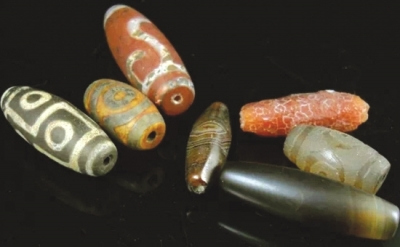

Archaeologists have for the first time found an ancient Tibetan "dzi" bead dating back to the second century AD in Ngari prefecture, southwest China's Tibet autonomous region. (Photo/Jingjiang Daily)
(ECNS) - Archaeologists have for the first time found an ancient Tibetan "dzi" bead dating back to the second century AD in Ngari prefecture, southwest China's Tibet autonomous region.
The dzi bead, with an internal hole of 0.2 centimeters in diameter, is 2.85 centimeters long and 0.5 centimeters in diameter. The texture is a mix of dark brown and milky white.
Li Linhui, vice director of the Cultural Relics Protection and Research Institute in Tibet, said on Tuesday that the dzi bead, also known as "heaven's pearl," was found in a cemetery built about 1,800 years ago. The location and funerary objects excavated there suggest that the tomb's owner came from a wealthy class.
Li also said the bead is the best-dated so far, and the earliest found in the Qinghai-Tibet Plateau, the world's highest plateau.
The finding provides very important first-hand material to understand the origins, forms, patterns and uses of dzi beads in Tibet, according to Li.
Dzi beads are thought to have served mainly decorative purposes. Other discoveries such as wood combs, bronze mirrors and weaving tools indicate that the tomb's owner was a female, Li added.
However, there is a possibility that the owner was male, as men also wore dzi beads, he said.
Copyright ©1999-2018
Chinanews.com. All rights reserved.
Reproduction in whole or in part without permission is prohibited.